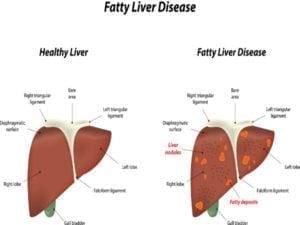 What is a Fatty Liver Disease? How to deal with it?
What is a Fatty Liver Disease? How to deal with it?
Each and every one of us is aware that liver is the largest, as well as the most significant part of our body. This organ not only helps your body in digesting food and storing energy, but it plays a more significant role in removing toxins from our body. This important fact about the liver makes it important for us to learn about the diseases of the liver and the ways to deal with them. To put it simply, maintaining the health of your liver is very important! Here, let’s learn about the serious liver condition called “fatty liver disease” and how to deal with it. So, just read on…
Fatty Liver Disease – What is it?
So, what is fatty liver disease? As the name suggests, this is a condition in which fats will build up in your liver. This is of two types:
Nonalcoholic fatty liver disease: This is a type of fatty liver condition that is not associated with excessive use of alcohol. This again can be sub-divided into two types:
- Simple fatty liver, a condition in which the patient will have fat contents in his/her liver, but without any inflammation or liver cell damage. Typically, this condition will not grow worse to lead to liver damage and other liver complications.
- Nonalcoholic steatohepatitis, a condition in which the patient will have inflammation and cell damage along with fat contents in the liver. As such, inflammation and cell damage can lead to other complications like fibrosis, cirrhosis, cancers, and so on.
Alcoholic fatty liver disease: As the name indicates, this is a type of fatty liver condition that is associated with excessive alcohol use. Generally, the liver will cut down a majority of alcohol that is consumed, so as to excrete it. However, the breaking down process can give out some dangerous substances that can damage your liver. This can also promote inflammation and diminish your innate immunity. Usually, an alcoholic fatty liver will happen to be the initial stage of other alcohol-associated liver diseases. This could lead to other severe conditions like alcohol hepatitis, liver cirrhosis, and so on.
Who is at risk of contracting a fatty liver disease?
It’s to be noted that the exact causes of fatty liver disease are not known yet. However, researchers have found out that the people with the following conditions are at risk of contracting the disease:
- Type-2 diabetes
- Pre-diabetes
- Obesity
- Middle-age
- Old age
- Belonging to certain ethnicities like Hispanic, non-Hispanic white, and African Americans
- Greater levels of fat (cholesterol and triglycerides) in the blood
- High blood pressure
- Use of certain medications like cancer drugs and corticosteroids
- Metabolic disorders
- Rapid loss of weight
- Infections
- Exposure to some toxins
According to various statistical reports, the nonalcoholic type of fatty liver disease is found to be affecting almost 25% of the world population. The major reasons that are being quoted for these numbers are the high of obesity, type-2 diabetes, and high cholesterol cases. On the other hand, the alcoholic type of fatty liver disease will only occur in heavy drinkers, especially women, obese, and those with genetic mutations.
How can a person know that he/she is having a fatty liver disease?
Both types of fatty liver diseases will not show any symptoms generally. Even if you have symptoms, they will be mild that will make you feel tired and have discomfort in the upper right corner of the abdomen.
Since there will be no symptoms, it’s not easy to understand if a person is having a fatty liver disease. A physician will suspect that you are having it if you receive abnormal results in a liver test that you are taking for other reasons. For the purpose of diagnosing, the physician will take a look at the patient’s medical history, a physical examination, and tests like blood tests, imaging, and biopsy.
How to deal with fatty liver disease?
If you suspect that you have fatty liver disease, all you have to do is to take steps to keep your liver healthy. In this line, “Livobion Capsules”, a strong hepato-protective and immune-supportive therapy will be helpful. The ingredients of this product are:
- DL-Methionine
- Choline Bitartrate
- Lysine Hydrochloride
- Vitamin B6
- Vitamin B12
- Niacinamide
- Biotin
- Folic Acid
Overall, the product is formulated to promote the healing process of your liver when at the same time being able to keep different types of liver infections at bay. It’s to be noted that the Livonian capsules can be used for various indications. In the case of fatty liver disease, it will help by promoting the competency of liver function. Other indications where Livobion capsules can be used are:
- Amino acid and vitamin deficiency
- Urinary tract infections
- Arthritis
- Allergies
- Chronic back pain
- Hyperhomocysteinemia
For more details about the product, click here.
Other ways to deal with fatty liver disease include weight loss for the cases of nonalcoholic fatty livers. Remember, reducing your weight will automatically reduce the fat contents in your liver, thereby decreasing the chances of fibrosis and inflammation.
In some cases, your doctor may suspect that your fatty liver is due to certain medications that you are taking. In such situations, you may have to stop that particular medication, with your doctor’s consent. Your doctor might also replace that medication with another.
In the case of nonalcoholic fatty liver diseases, you must remember that there are no drugs approved yet to treat the condition. Currently, there are some studies are ongoing to see if certain diabetes medications and vitamin E can be of help. Most important of all is to quit drinking alcohol, in order to treat the condition.
Final Pointers:
Finally, remember that some lifestyle changes can help you with the fatty liver disease. Remember to eat a balanced diet with lots of veggies, fruits, and whole grains. Limit your salt and sugar intake. Get your hepatitis and pneumococcal vaccinations. Do regular exercises. Furthermore, taking dietary supplements like Livobion can be helpful.

